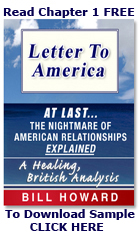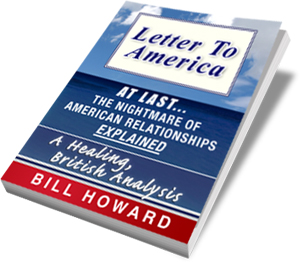Since the mid-1960s a truly original thinker, London psychotherapist Bill Howard, has been engaged in a private, part-time analysis of the culture, customs, habits and lifestyle of the North American people. Unique amongst contemporary studies of human relationships, Bill examines the full range of America’s social and interpersonal processes and proffers a candid, compassionate and uncompromisingly honest diagnosis of what he calls: " … the many self-engendered psychological difficulties and complexities that afflict American intimate interaction."
|
|
~ Indu Naipal |
"Highly thought-provoking … Shows imagination and courage… Howard deserves to be taken very, VERY seriously… His robust common sense may be the first step towards restoring sanity to American relationships..." |
~ Eileen Ho |
| "Pulling no punches, Bill Howard explains not only how Mr America lost his domestic freedom but how he can reclaim it! 'Letter to America', the devastatingly accurate, relationship masterpiece that is set to take all America by storm is the book for 21st Century American man… a must!" |
~ Peter Lloyd-Reynolds |
At last… America, always so hard to understand at a distance, is explained. By drawing on a huge range of empirical data a British psychoanalyst has disentangled the maze of American relationships to present an integrated overview of American mental life in simple, understandable prose. For me, Bill Howard’s brilliant new book Letter To America demystifies ‘the American experience’ and brings a deep and profound expansion of our understanding of that country’s values, attitudes and lifestyle characteristics.
|
|
~ Jiang Chao |
| "This timely and lively-written landmark study successfully extrapolates the inner essence of the American psyche…" |
| ~ Marcus Huxley |
| "Bill Howard says the unsayable - and that is what makes him right! 'Letter to America' is one small step for man, one giant leap for American men - and their partners…" |
| ~ Nirmal Chaudhuri |
LETTER TO AMERICA, psychoanalyst Bill Howard’s in-depth interpretation of America’s relationship problems, sex wars, social values, attitudes and behaviour may well prove to be the most important book ever written on the subject. Tempered by appropriate sensitivity this sometimes tersely-expressed account provides some profound insights into emotionally-stifled America; a land of more complicated secrets than could possibly have been imagined before now.
|
|
~ The Sunday Chronicle |
Many wonderful advances in disease diagnosis and understanding have been made during the scientific and medical explosion of the 20th Century, yet an ever-growing body of evidence suggests that humanity is actually less happy and settled today - and certainly more neurotic - than previous generations. Some argue that a prime source of much emotional illness is America and, in submitting his identification of The American Neurosis and the social origins of such a disorder, Bill Howard contends that there is enough commonality between America's unique cultural features and acquired characteristics of the populace to suggest that they are derived from a single source of social maladjustment. He asserts that most elements of America's unique lifestyle are manifestations of this one condition.
|
|
~ Ranjit Vethakhan |



 All couples go through challenging times of course, but Americans, as we have come to know, more than most, and require a different approach to helping disengaged or unco-operative partners. After explaining how to move their unconscious feelings and thought patterns out of emotional anaesthesia and into awareness, Howard offers his American readers fresh insights into how to establish new relationships that are genuine and unaffected, and how to introduce greater freedom through fearless honesty into existing ones.
All couples go through challenging times of course, but Americans, as we have come to know, more than most, and require a different approach to helping disengaged or unco-operative partners. After explaining how to move their unconscious feelings and thought patterns out of emotional anaesthesia and into awareness, Howard offers his American readers fresh insights into how to establish new relationships that are genuine and unaffected, and how to introduce greater freedom through fearless honesty into existing ones.